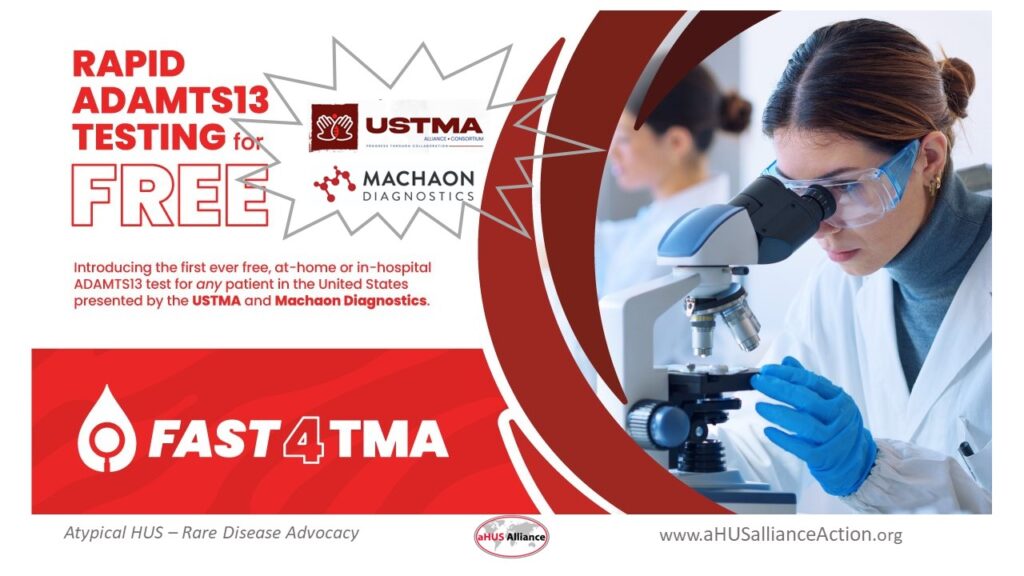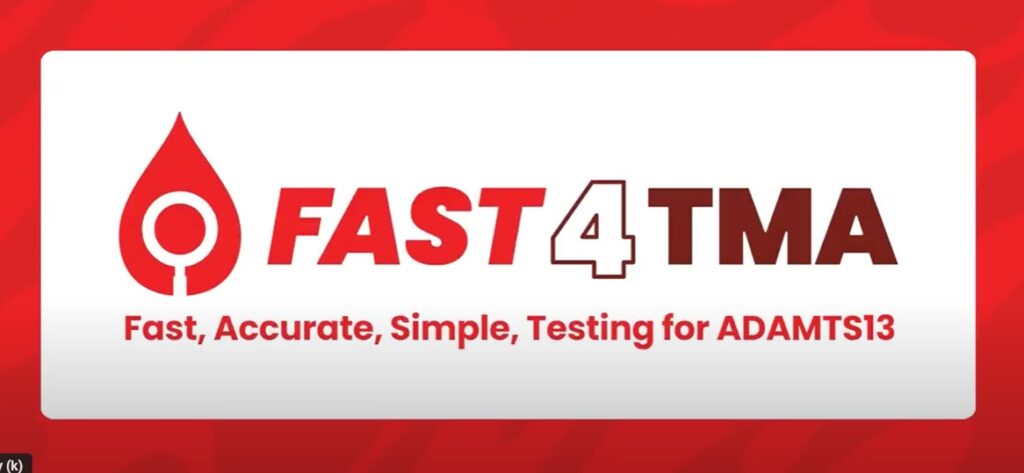
USTMA has partnered with Machaon Diagnostics to offer free ADAMTS13 testing through the new ‘Fast 4 TMA’ program for patients in the United States. This new program can help provide critical information to physicians treating patients who are ill, but showing symptoms that could be aHUS, TTP, or another syndrome on the thrombotic microangiopathy (TMA) spectrum. Time is of the essence when a person seeks medical help and the physician suspects atypical HUS, and this ‘Fast 4 TMA’ program allows blood draws to be done at home or office, at no charge to the patient.
Is this a test for aHUS?
Currently there’s no single and definitive test for atypical HUS. Instead other medical conditions are ruled out by various criteria until aHUS becomes the ‘diagnosis by exclusion’. Measuring the levels of ADAMTS13 activity is a key factor to consider when medical teams are faced with differentiating aHUS from conditions with similar characteristics.
Why is the program called ‘Fast 4 TMA’, but this program is available for aHUS patients anywhere in America?
According to John Hopkins Medicine, “Thrombotic microangiopathies (TMA) are clinical syndromes defined by the presence of hemolytic anemia (destruction of red blood cells), low platelets, and organ damage due to the formation of microscopic blood clots in capillaries and small arteries.” People may be familiar with commonly ordered blood tests (e.g. the CBC panel) which can measure low platelet and red blood cell levels, but more specialized tests are needed to help medical teams determine causes behind why abnormal levels exist. This fast return of ADAMTS13 levels can help medical teams an important tool to distinguish which type of TMA is involved. A more rapid and accurate diagnosis to provide appropriate treatment will yield better outcomes for patients.
What are some basic facts about Fast 4 TMA for USA patients & family caregivers?
The entire Fast4TMA program is free. Insurance is not collected, and no payment method is requested.
The patient’s physician must order the test, and handles all discussion of results with the patient or their designated caregiver. USTMA offers Peer to Peer support for providers if needed.
If the patient opts in, de-identified data such their city, gender and ethnicity are shared with USTMA. Test results are not sent to nor stored at USTMA.
Fast 4 TMA provides information about ADAMTS13 levels, not genetic testing, and is meant to help diagnose patients inpatient with aHUS or TTP sooner.
Learn More: ADAMTS13 testing can help distinguish aHUS apart from other syndromes and has been written about in multiple scientific journals. Here’s one scientific publication on this topic, with very concise title:
Oh J et al. & Korean TTP Registry Investigators. Prognostic utility of ADAMTS13 activity for the atypical hemolytic uremic syndrome (aHUS) and comparison of complement serology between aHUS and thrombotic thrombocytopenic purpura. Blood Res. 2019 Sep;54(3):218-228. doi: 10.5045/br.2019.54.3.218. Epub 2019 Sep 25. PMID: 31730685; PMCID: PMC6779945.
Where can I learn more about Fast 4 TMA?

Visit the website FMI & to Enroll in Fast4TMA

